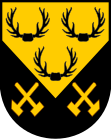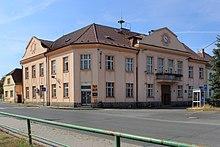Zbůch
| Zbůch | ||||
|---|---|---|---|---|
|
||||
| Basic data | ||||
| State : |
|
|||
| Region : | Plzeňský kraj | |||
| District : | Plzeň-sever | |||
| Area : | 857 ha | |||
| Geographic location : | 49 ° 41 ' N , 13 ° 13' E | |||
| Height: | 338 m nm | |||
| Residents : | 2,501 (Jan. 1, 2019) | |||
| Postal code : | 330 22 | |||
| traffic | ||||
| Railway connection: | Plzeň – Furth in the forest | |||
| structure | ||||
| Status: | local community | |||
| Districts: | 2 | |||
| administration | ||||
| Mayor : | Jiří Hájek (as of 2007) | |||
| Address: | Náměstí 5 330 22 Zbůch |
|||
| Municipality number: | 559661 | |||
| Website : | www.zbuch.cz | |||
Zbůch (German Zwug ) is a municipality in the Czech Republic . It is located 14 km southwest of Pilsen at 338 m nm on the Zálužský potok brook , has an area of 857 ha and is located in the Okres Plzeň sever .
The village is located three km south of the D5 motorway and its exit 93 - Nýřany and on the railway line from Pilsen to Domažlice .
history
Zbůch was first mentioned in 1253 as the property of the Premonstratensian monastery Chotěšov . Since the Middle Ages there has been a Vorwerk in Zbuch , which has been owned by various noblemen over the years . In the Thirty Years' War the village became deserted and the Berní rula shows only 5 farms in the village for 1655.
After the monastery was dissolved, Zwug belonged to the Religionsfonds from 1782 and after its dissolution from 1822 to the princes of Thurn und Taxis until the patrimonial rule was replaced .
The railway connection from Pilsen to Furth im Wald , opened in 1861, ran through the village, but it was not until 1906 that Zwug received a train station.
After the mining of hard coal in the Pilsen basin increased at the end of the 19th century , the West Bohemian Mining Association in Pilsen also began mining coal near Zwug in 1889.
The Teinitzl colliery opened in 1889 on the southwestern Zwuger Fluren near the village of the same name. In 1918 it was named Masaryk Colliery .
The Austria colliery was established in 1906 east of the town near Rothaujezd (Červený Újezd), where two shafts were sunk to mine the coal seams stored in 720 m and 800 m depths . It turned out that the coal was of a particularly high quality. During this time Zwug developed into a mining town. Most of the miners were Czech and workers' housing estates were built around the mines.
After the establishment of the First Republic, the Zeche Austria was given the new name Masaryk-Jubiläums-Zeche . In 1938, as a result of the Munich Agreement , Zwug became part of the German Empire and belonged to the Sudeten German district of Mies . In the same year the Masaryk-Jubiläums-Zeche was renamed Adolf-Hitler-Schacht and the Masaryk-Zeche as Hermann-Göring-Schacht .
During the Second World War , around 800 French and Soviet prisoners of war were used in the mines . The total workforce of the Adolf-Hitler-Schacht in 1939 was 1,387 people, of which 947 worked underground and 364 were employed as day laborers. The output was 391,100 tons of coal. At the same time, the workforce on the Hermann-Göring-Schacht near Teinitzl was 797, of whom 538 were employed as workers below and 217 above, and produced an annual output of 281,100 t.
At the beginning of May 1945 soldiers of the 3rd US Army occupied the place. The German population was expelled after the war and Czechs from Pilsen and the surrounding area were settled. The Masarykův jubilejní důl (Masaryk Jubilee Colliery) was renamed again in 1948 as Důl obránců míru (Peace Fighters Mine ).
In 1965 the Masarykův důl mine (Masaryk colliery) near Týnec was shut down and in 1977, when the Důl obránců míru mine was closed, coal mining in Zbůch was completely stopped . In the 1970s and 1980s most of the mining facilities were removed. The 100 m high spoil dump was also partially removed, but it remained with a significantly reduced height as a material evidence of mining.
After 1990, businesses, including a spice mill, were established on the former site of the mine.
South of Červený Újezd is the former military airfield, today the closed international airfield Pilsen / Líně .
Attractions
- In Zbůch there is a statue of the first Czechoslovak President Tomáš Garrigue Masaryk and a chapel.
- In Červený Újezd there is a log house from 1773
Community structure
The district of Červený Újezd ( Rothaujezd b. Auherzen ) belongs to the municipality of Zbůch .


